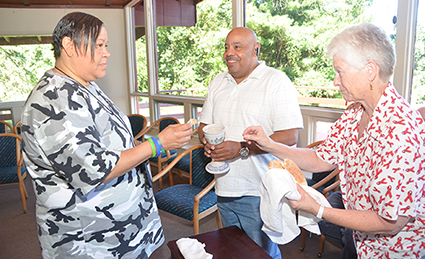
Quality of Life Retreats: Celebrating a 25-year journey
By John W. Coleman*

After nearly 30 years of living with HIV, Bill Taylor, 48, says he’s surprised and grateful that he’s still around, especially after years of substance abuse and reckless behavior. But he admits he might not have survived this long without the help of Quality of Life Retreats, a ministry of the Baltimore-Washington Conference. (Editor’s note: Don’t use the word “victims” when referring to people living with HIV and AIDS. Also, don’t combine the abbreviations HIV and AIDS when referring specifically to persons who might have the former and not the latter — i.e., the usage should be HIV and/or AIDS, not HIV/AIDS, unless referring to the overall, combined disease.)
Since 1988, Quality of Life Retreats has provided much-needed respite, renewal and relationships, along with vital education and encouragement, for more than 3,400 HIV-positive persons at nearly 100 retreats. The ministry is celebrating that 25-year history during each of its 2013 retreats and other events.
At three retreat sites this year — the conference-owned Manidokan Camp and Retreat Center, the Catholic-owned Washington (DC) Retreat House, and the Lutheran-owned Mar-Lu Ridge Retreat Center —there have been birthday parties with cake, banners, singing and dancing, recounted history and shared reflections on the journey. The final 2013 retreat — for which applications are being accepted — will occur Dec. 16-19 at the Washington Retreat House, near Catholic University.
“Retreatants,” as they are called, usually number 30 to 40 per retreat and come to learn about disease management, coping skills and treatment options, but they also dialogue, play, enjoy nature, create art, find friends and mentors, worship and experience spiritual formation. The quarterly, four-day gatherings provide a safe, supportive environment where participants can be transparent, free of inhibitions, and share openly about their own personal journeys: their joys, pains and deepest concerns.
For Taylor, a quiet, slender, self-possessed Army veteran who eagerly shares his own remarkable story, that receptive environment has been key to his journey toward wholeness. He has attended about a half-dozen retreats since about 2010 and often assists the all-volunteer retreat staff.
“I want to give back because I’ve gotten so much out of Quality of Life. It’s helped me to mature and learn from other people,” he said. “I came to my first retreat fresh out of (substance abuse) treatment, and I was barely making it. I needed help dealing with my addiction recovery and HIV status.”
Taylor, who lives in Martinsburg, W. Va., helps other HIV-positive patients at the Veterans Affairs Medical Center there, and he tells them all about Quality of Life Retreats. Each retreat held in Western Maryland draws a handful of veterans from the center, but Taylor wants to see more attend and benefit from the experience.
“I try especially to help the newly diagnosed because this can be a very traumatic disease,” he said. “Contrary to popular belief, HIV/AIDS can still kill you. You don’t just take a few pills; you have to do a lot more to care for yourself and keep your spirits up.”
Indeed, while many believe recent treatment advances have abated the disease’s lethality, it still claims precious lives every day. Many aging survivors suffer from frustration, isolation and related illnesses as their health declines; many retreat attendees are near age 50 or older.
Funding for creative solutions to the suffering caused by HIV and AIDS has severely declined, and that includes Quality of Life Retreats. Modest annual support comes from the United Methodist Committee on Relief (UMCOR), the Baltimore-Washington Conference, the DC Aquatics Club’s Swim for Life benefit competition, and a handful of loyal churches — namely Foundry UMC through its Concert for Life benefit, Grace UMC in Baltimore, Linden-Linthicum UMC in Clarksville, and Glen Burnie UMC, which also provides transportation on its church bus for Baltimore retreatants.
The Quality of Life Retreats board is sending an Advent appeal letter seeking additional support to selected BWC churches in November and will also try to plan cooperative fundraising events for 2014.
“We hope to continue offering these retreats quarterly next year; but it will be a real challenge to find the necessary funds,” said board chairman Raymond Shattuck, a member of Arnold UMC in Annapolis. “We’re always excited to have first-timers, especially the newly diagnosed, but we also appreciate those who keep coming back as though their very lives depended on it.”
Many lives have depended on Quality of Life Retreats over its 25-years of rendering compassionate service and a community of support to people living with HIV and AIDS. And as Bill Taylor and many others will attest, its vital mission is far from over.
*John Coleman was recently hired to be the Coordinator of Communications and Social Media for the Eastern Pennsylvania Conference.

Login/Register to leave comment